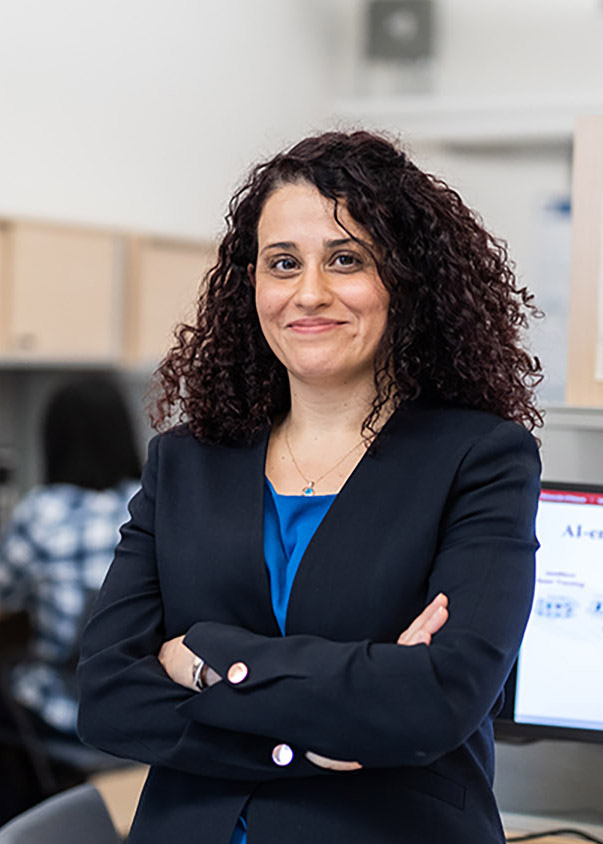LCN Keynote Presentations
Monday, 4 October 2021, 0900-1000 MDT (UTC -06:00)
AI-Enabled Wireless Networks: A Vision for 6G
Dr. Melike Erol-Kantarci
Canada Research Chair in AI-enabled Next-Generation Wireless NetworksAssociate Professor
School of Electrical Engineering and Computer Science
University of Ottawa
Ottawa, Ontario, Canada
ABSTRACT
6G is expected to support a multitude of services demanded by Enhanced Mobile Broadband (eMBB), Ultra-Reliable and Low-latency Communications (uRLLC), and massive Machine Type Communications (mMTC) user types that are already carried over 5G, and additionally provide extensive support for traffic emerging from Internet of Senses, high-precision navigation and coordinated machine applications. Heterogeneous devices with different quality of service (QoS) demands will require intelligent and flexible allocation of network resources in response to network dynamics. For instance, a highly reliable and low-latency network is needed to enable rapid transfer of messages between connected autonomous vehicles. At the same time, the same physical infrastructure is expected to serve users with high-quality video demand or even mobile Augmented/Virtual Reality entertainment applications. Next-generation wireless networks are expected to accommodate such diverse use cases. In addition, resource efficiency, reliability, and robustness are becoming more stringent for 6G. To meet this, future wireless networks must incorporate a paradigm shift in network resource optimization, in which efficient and intelligent resource management techniques are employed. Artificial intelligence, or more specifically machine learning algorithms stand as promising tools to intelligently manage the networks such that network efficiency, reliability, robustness goals are achieved and quality of service demands are satisfied. The opportunities that arise from learning the environment parameters under varying behavior of the wireless channel, positions AI-enabled 5G and 6G, superior to preceding generations of wireless networks. In this keynote, we will provide an overview of the state-of-art in machine learning algorithms and their applications to wireless networks, in addition to their challenges and the open issues in terms of their applicability to various functions of future wireless networks.
ABOUT THE SPEAKER
 |
Melike Erol-Kantarci is Canada Research Chair in AI-enabled Next-Generation Wireless Networks and Associate Professor at the School of Electrical Engineering and Computer Science at the University of Ottawa. She is the founding director of the Networked Systems and Communications Research (NETCORE) laboratory. She is a Faculty Affiliate at the Vector Institute, Toronto, and the Institute for Science, Society and Policy at University of Ottawa. She has over 150 peer-reviewed publications which have been cited over 6000 times and she has an h-index of 39. She has received numerous awards and recognitions. Recently, she received the 2020 Distinguished Service Award of the IEEE ComSoc Technical Committee on Green Communications and Computing. She was also named as N2Women Stars in Computer Networking and Communications in 2019. Dr. Erol-Kantarci has delivered 50+ keynotes, tutorials and panels around the globe and has acted as the general chair and technical program chair for many international conferences and workshops. Her main research interests are AI-enabled wireless networks, 5G and 6G wireless communications, smart grid and Internet of things. She is an IEEE ComSoc Distinguished Lecturer, IEEE Senior member and ACM Senior Member. |
Tuesday, 5 October 2021, 0900-1000 MDT (UTC -06:00)
Automated Management of Softwarized and Virtualized Network Functions
Prof. Xiaoming Fu
University of GöttingenGermany
ABSTRACT
Online management of large-scale cloud and virtualized resources poses many challenges and opportunities. As emerging network appliances, such as firewalls, loadbalancing, QoS and DPI, are more and more implemented as software-defined functions and converging on the cloudized and virtualized network infrastructure, the management of such functions becomes more and more critical. I will introduce some of our recent work towards efficient management of NFV-based service chaining, placement of data and virtual machines (VMs), as well as scheduling of NFV resources.
ABOUT THE SPEAKER
 |
Prof. Xiaoming Fu received his Ph.D. from Tsinghua University, Beijing, China in 2000. He was then a research staff at the Technical University Berlin until joining University of Göttingen as an assistant professor in 2002, where he has been a professor in computer science and heading the Computer Networks Group since 2007, and the founding director of Sino-German Institute of Social Computing since 2015. Prof. Fu's research interests lie in networked systems and applications, including cloud computing, mobile computing, big data and social networks. He has actively participated in national and international projects, including as coordinator of EU FP7 GreenICN, CleanSky and MobileCloud projects as well as H2020 ICN2020 project. He has also served on the program or organization committees of several conferences such as ACM SIGCOMM, CoNEXT, MOBICOM, ICN, IEEE INFOCOM, ICNP and ICDCS. He is a Fellow the IET and the Academia Europaea, an IEEE senior member and Distinguished Lecturer, and has served as secretary (2008-2010) and vice chair (2010-2012) of IEEE Communications Society Technical Committee on Computer Communications (TCCC), as well as as chair (2011-2013) of the Internet Technical Committee (ITC), the joint committee of IEEEE Communications Society and the Internet Society. |
Wednesday, 6 October 2021, 0900-1000 MDT (UTC -06:00)
6G — The Road Ahead
Prof. Matti Latva-aho
University of OuluFinland
ABSTRACT
As 5G is being commercialized, the research community is focusing now on solutions for 2030 era. Besides the technical superiority KPIs, global megatrends and UN sustainability goals are emerging critical drivers towards 2030 solutions. Global coverage with services scaling, super-efficient short range connectivity and accurate localization are missing features within current mobile systems and deserve special attention. Value chains are likely to be revolutionized via emergence of different verticals needs as well as local spectrum licensing. Ownership of spectrum, network infrastructure as well as customers will need to be rethought for different use scenarios and future needs. Customized private/local networks is an emerging trend which needs to be supported in future regulation decisions.
ABOUT THE SPEAKER

Matti Latva-aho is a Director for 6G Flagship Program in Oulu, Finland, and serves as an Academy Professor in the University of Oulu, where he has worked on wireless communications research since early 1990s. He was a Director of Centre for Wireless Communications (CWC) at the University of Oulu during the years 1998−2006, and a Head of Department of Communication Engineering until 2014. Prior to his joining the CWC, Matti worked as a Research Engineer at Nokia Mobile Phones in Oulu, Finland. Matti completed his Ph.D. in Electrical Engineering at the University of Oulu, Finland in 1998. His research interests lie in the area of wireless radio data communications, and currently his research group focuses on 6G systems research ranging from theory to design and implementation. He has worked so far with all the generations from 1G to 6G of mobile networks. Matti has published close to 500 conference or journal papers in the area of wireless communications. He has received a several awards, including Nokia Foundation Award in 2015 for his achievements in wireless communications research. |
